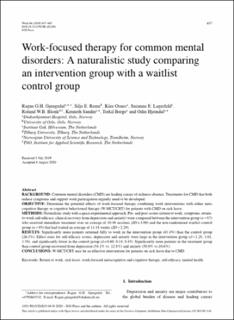| dc.contributor.author | Gjengedal, Ragne Gunnarsdatter Hole | |
| dc.contributor.author | Reme, Silje Endresen | |
| dc.contributor.author | Osnes, Kåre | |
| dc.contributor.author | Lagerfeld, Suzanne E. | |
| dc.contributor.author | Blonk, Roland W. B. | |
| dc.contributor.author | Sandin, Kenneth | |
| dc.contributor.author | Berge, Torkil | |
| dc.contributor.author | Hjemdal, Odin | |
| dc.date.accessioned | 2021-02-17T14:56:22Z | |
| dc.date.available | 2021-02-17T14:56:22Z | |
| dc.date.created | 2020-10-16T11:08:48Z | |
| dc.date.issued | 2020 | |
| dc.identifier.citation | Work : A journal of Prevention, Assesment and rehabilitation. 2020, 66 (3), 657-667. | en_US |
| dc.identifier.issn | 1051-9815 | |
| dc.identifier.uri | https://hdl.handle.net/11250/2728752 | |
| dc.description.abstract | BACKGROUND:
Common mental disorders (CMD) are leading causes of sickness absence. Treatments for CMD that both reduce symptoms and support work participation urgently need to be developed.
OBJECTIVE:
Determine the potential effects of work-focused therapy combining work interventions with either meta cognitive therapy or cognitive behavioural therapy (W-MCT/CBT) for patients with CMD on sick leave.
METHODS:
Naturalistic study with a quasi-experimental approach. Pre- and post-scores (return to work, symptoms, return-to-work self-efficacy, clinical recovery from depression and anxiety) were compared between the intervention group (n = 87) who received immediate treatment over an average of 10.40 sessions (SD = 3.09) and the non-randomized waitlist control group (n = 95) that had waited an average of 11.18 weeks (SD = 2.29).
RESULTS:
Significantly more patients returned fully to work in the intervention group (41.4%) than the control group (26.3%). Effect sizes for self-efficacy scores, depression and anxiety were large in the intervention group (d = 1.28, 1.01, 1.58), and significantly lower in the control group (d = 0.60, 0.14, 0.45). Significantly more patients in the treatment group than control group recovered from depression (54.1% vs. 12.8%) and anxiety (50.0% vs.10.6%).
CONCLUSIONS:
W-MCT/CBT may be an effective intervention for patients on sick leave due to CMD. | en_US |
| dc.language.iso | eng | en_US |
| dc.publisher | IOS Press | en_US |
| dc.rights | Navngivelse-Ikkekommersiell 4.0 Internasjonal | * |
| dc.rights.uri | http://creativecommons.org/licenses/by-nc/4.0/deed.no | * |
| dc.title | Work-focused therapy for common mental disorders: A naturalistic study comparing an intervention group with a waitlist control group | en_US |
| dc.type | Peer reviewed | en_US |
| dc.type | Journal article | en_US |
| dc.description.version | publishedVersion | en_US |
| dc.source.pagenumber | 657-667 | en_US |
| dc.source.volume | 66 | en_US |
| dc.source.journal | Work : A journal of Prevention, Assesment and rehabilitation | en_US |
| dc.source.issue | 3 | en_US |
| dc.identifier.doi | 10.3233/WOR-203208 | |
| dc.identifier.cristin | 1840100 | |
| dc.description.localcode | 0 © 2020 – IOS Press and the authors. All rights reserved This article is published online with Open Access and distributed under the terms of the Creative Commons Attribution Non-Commercial License (CC BY-NC 4.0). | en_US |
| cristin.ispublished | true | |
| cristin.fulltext | original | |
| cristin.qualitycode | 1 | |

